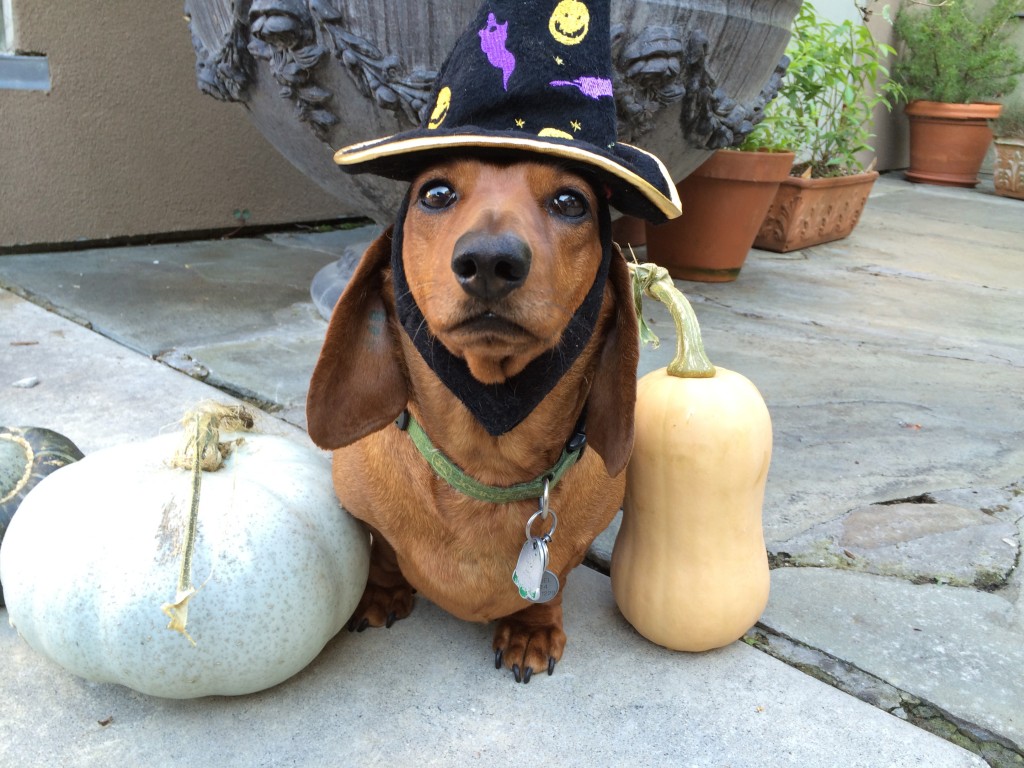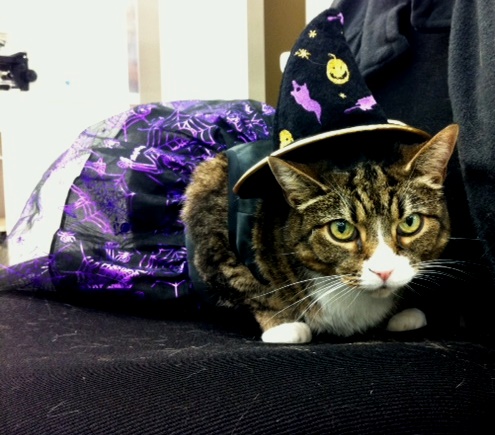Halloween is a favorite festive time for many, filled with candies and costumes. For our four legged friends however, it can be a dangerous and stressful time of year. Halloween presents an array of hazards, which can be easily avoided to ensure a safe and happy Halloween season.
Chocolate: Without a doubt one of the most commonly known and most dangerous toxins to our pets is chocolate. During the Halloween season many of us see an increase of chocolate in our homes. Just like us, our pets are drawn to its sweet taste and scent, and as many know, once you start eating chocolate it can be hard to stop. So what makes chocolate so dangerous? Chocolate comes from the roasted seeds of Theobroma Cacoa which contains caffeine and theobromine, both of with are toxic to dogs. The more theobromine and caffeine that a cocoa product contains (the darker and more bitter the chocolate is), the more poisonous it is to your dog. Symptoms to watch for if your dog has ingested chocolate are vomiting, diarrhea, lethargy, agitation, increased heart rate, increased thirst, and seizures. If you think your pet has ingested chocolate it is very important to take them to your veterinarian as soon as possible, so your vet can induce vomiting while the chocolate is still in the stomach.
Candy and Candy Wrappers: Many pets, especially dogs, will gorge themselves on any tasty treats they can get their paws on, and candies are no exception. The high sugar and fat content can cause pancreatitis, which is inflammation of the pancreas. The pancreas is an organ that resides just below the stomach; it is responsible for the production of digestive juices and enzymes. The consumption of fatty foods (such as candies) or even a sudden change in diet can cause it to become inflamed. If this occurs, the pancreas essentially starts to digest itself and surrounding tissues. The tricky thing with pancreatitis is that symptoms will often not occur until a few days after ingestion. Symptoms include decreased appetite, vomiting, diarrhea, lethargy, and abdominal pain. If left untreated, pancreatitis can lead to severe dehydration, kidney failure and other organ damage.

When pets eat candies, they typically don’t remove the wrappers first. Cellophane and tin foil wrappers can be especially harmful as they can lead to bowel obstruction, which often requires surgical intervention to remove. Symptoms of obstruction are commonly unproductive vomiting, abdominal pain and decreased appetite.
Raisins and Grapes: Some more health conscious folks will give out small boxes of raisins or even chocolate covered raisins during the Halloween season. Raisins can be very toxic, with the potential of causing kidney damage. What exactly in the grape or raisin that is so toxic is still for the most part unknown. Raisins and grapes are especially dangerous because any amount ingested can potentially be toxic. Symptoms can be vomiting, nausea, decreased appetite, lethargy, abdominal pain and kidney failure.
Costumes: I think we can all admit that it is extremely adorable to see our pets in costumes; however some costumes are not so cute to our pets. Many of them can be ill-fitting and uncomfortable, restricting your pet’s sight and movement. They can be full of small pieces, buttons, snaps, and beads, which if chewed on or swallowed could be very dangerous. Never leave your pet alone while wearing their costume, they could become tangled and injure themselves. Limit the amount of time your pet spends in their costume to ensure they stay comfortable and happy.
Fireworks and Loud Noises: Constant knocking at the door, chatter and squealing around the neighborhood and the incessant banging of fireworks or firecrackers can cause a lot of stress and anxiety to our pets. If your pets are outside they can be spooked by these loud noises; keep your pet indoors to ensure they don’t run off somewhere. Ensure you have a quiet secure area where your pet can relax during the trick or treatin’ hours if you know they may be stressed out by the many knocks.
So while scary costumes, fireworks, and candy can be fun for us, it is important to keep in mind it may not be the case for our fury counterparts. It really only takes a few extra steps to ensure your pet is safe and secure this Halloween season. Be sure to have your veterinarian’s number handy as well as the Pet Poison Hotline in the event of any accidents.

